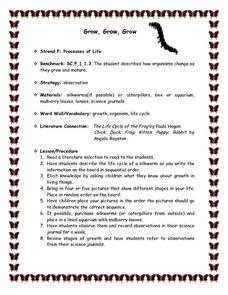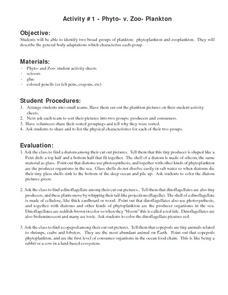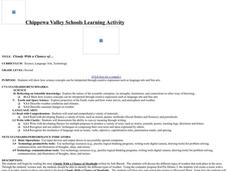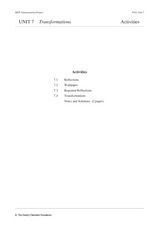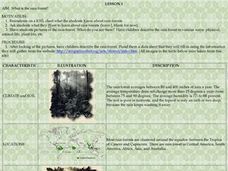Curated OER
Shapes and Colors All Around
Students tour their school in a scavenger hunt to find primary colors and two and three-dimensional shapes. Students take digital pictures of the colors and shapes they find and create a class book of the pictures.
Curated OER
Mining For Descriptive Gold
Students describe places using language that is as vivid as possible. They will examine the writer's craft in describing a place by reading and discussing "Resurrecting the Miner's World." They will then revise their descriptive pieces...
Curated OER
Multiple Use Flower Power Graphic Organizer
In this multiple use flower power graphic organizer worksheet, students use a flower shaped black line picture in a number of ways. They put a picture in the middle circle and place describing words in the petals. They place a prefix or...
Curated OER
The Effects of Pesticides on the Food Chain
Fourth graders generalize that all animals, including people, depend on plants as a food source. In this science lesson plan, 4th graders describe and construct a food chain, tell how pesticides enter the food chain, and discuss possible...
Curated OER
HARLEM RENAISSANCE
Students analyze historical conditions which led African Americans to settle in Harlem. They describe the culture of everyday life in Harlem and identify individuals significant to the Harlem Renaissance and describe their contributions...
Curated OER
Kids in the Colonies
Students compare and contrast family life in colonial America with life today. They describe what communities were like in colonial times and how they varied from life today. A spokesperson from each group will present a verbal report...
Curated OER
Grow, Grow, Grow
Students listen to literature selection, describe life cycle of silkworm, discuss what they know about growth in living things, observe silkworms for one week and record observations in science journals, and review stages of growth.
Curated OER
Phyto- v. Zoo- Plankton
Students identify two broad groups of plankton: phytoplankton and zoo plankton. They describe the general body adaptations which characterize each group. They discuss and write about what it would be like to be carried around by the...
Curated OER
Cloudy With a Chance of...
Second graders will write a story. In this writing and meteorology lesson, 2nd graders read the story Cloudy With a Chance of Meatballs, then use KidPix to create a weather picture. The picture is imported into a word processor and the...
Curated OER
Preposition Recognition
In this recognizing prepositions worksheet, students observe pictures, read sentences with the prepositions in, on, over, under, beside, between, behind, and in front of, and choose the sentence that correctly describes the picture....
Curated OER
Unit 7 Transformations
In this transformations worksheet, students observe the errors in the reflection of a picture. They determine the number of transformations needed to complete a grid. Students perform reflections according to directions and...
Curated OER
Forces
In this forces worksheet, students read about Newton's law of motion and decide whether pictures are pushing or pulling. Students decide the push or pull for 4 pictures.
Curated OER
Harriet Tubman
Students investigate Harriet Tubman. In this African-American lesson, students read the book A Picture Book of Harriet Tubman and discuss how she was a conductor of the Underground Railroad. Students identify the leadership qualities she...
Curated OER
For Sale!
Students give an oral presentation. In this Spanish activity, students work in groups to describe a house for sale using Spanish. Students use a digital camera to take pictures of their house and create a newsletter/flyer using...
Curated OER
What is the Rainforest?
Learners investigate rainforests. In this rainforest lesson, students brainstorm on a KWL chart about what they already know about the rain forest. Learners are shown pictures of the rain forest and describe what they see in the photos....
Curated OER
Vocabulary Choice Board Lesson 17
In this vocabulary usage worksheet, students choose cards to describe vocabulary words and participate in activities such as illustrating pictures, making lists, making charts, writing short stories, and playing games. Students choose 9...
Curated OER
Homes of the West
Fourth graders read about homes in Utah over time and design models of the homes. In this homes of the west instructional activity, 4th graders draw and label five homes that existed in the west. Students research each home and...
Curated OER
Science Performance Assessment
You can use performance assessments to obtain a richer and more complete picture of what your students know.
Curated OER
Descriptive Paragraphs
Third graders gain the necessary skills to write a descriptive paragraph. They see the evaluation and decision making process that are used in good wriitng. The bible is used to see illustrations and then used to paint a picture in...
Curated OER
States of Matter
Fourth graders define the term matter. They compare properties of solids, liquids, and gases. They describe how matter changes from one state to another. They classify objects as either solid, liquid, or gas.
Curated OER
Dr. Seuss For a Day
Second graders brainstorm words to describe Thing One and Thing Two characters from Dr. Seuss computer program, use variety of adjectives to create descriptions, and create new set of characters, Thing Three and Thing Four, by drawing...
Curated OER
Caldecott Tunnel
Students visit the Caldecott Tunnel. They examine dark brown basalt and the gray-green sedimentary rocks and draw picture of the rock layers in the cliff face. In addition, they write a short paragraph describing what you observe about...
Curated OER
Health Grade 1
First graders determine the difference between good and bad drugs. In this lesson plan about drug awareness, 1st graders explore differences between drugs. Students will look at picture and understand what uses there are for drugs....
Curated OER
Know Your Cousins - Monotremas, Marsupials, and Placentals
Students discover various mammals. In this biology lesson plan, students recognize characteristics of mammals and categorize mammal groupings. Students describe how mammals grow inside the mother's body and resemble their parents at birth.








